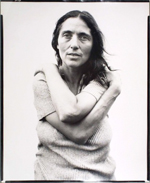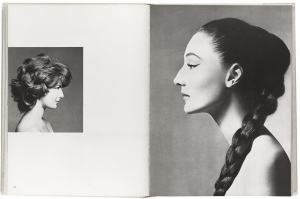Erik Palmer, creative director of Vico Collective and teacher of communication theory at Portland State added another great comment, this time to Wayne’s personal observation.
As the end of the month draws near, I think it is also worth reflecting further on the creative and personal connections between Avedon and Robert Frank. As Wayne mentions, and as best narrated in Jane Livingstone’s book on the New York School, Avedon and Frank both worked for and studied with Brodovitch in the 1940s and 50s, although Avedon certainly had a closer relationship with the mentor.
As I was working on my dissertation, I spent a lot of time paging through old bound issues of Harper’s Bazaar in my university library, and I found a lot of product still lifes and other commercially motivated images bylined to Frank.

But I think it is most interesting to consider the relationship between The Americans and Avedon’s In The American West. Although the approach to photography of the two books could hardly be more visually distinct, I believe that Avedon set out to put his own mark on the kind of photographic grand tour that Frank originally perfected.

Both explored the west and sought to tell its story. And both told a controversial story of the failure of American ideals. Both were criticized for the perceived ugliness of their vision. Avedon photographed Frank and his wife (June Leaf, in what I think is a hidden gem among Avedon’s white background portraits) in the late 70s, and I suspect that their encounter was fresh on Avedon’s mind when he set out on his Western project.
Erik Palmer
